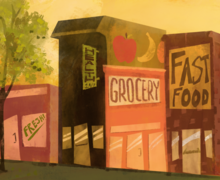This Pulitzer-Prize winner rode on the top of freight trains for 1,600 miles to cover immigration
Natalie Brigham | Daily Orange
Sonia Nazario was the final speaker for the 2016-2017 University Lecture Series, and her speech was held in Hendricks Chapel.
Sonia Nazario on Wednesday evening urged the Syracuse community to consider rising to the level of humanity that is required to uphold core values “that honestly make us who we are.”
A Pulitzer Prize-winning journalist for her work covering the journey of child immigrants into the United States, Nazario spoke about revealing the truth about immigration and other social issues. She was the final speaker for the 2016-2017 University Lecture Series, and her speech was held in Hendricks Chapel.
Nazario, a daughter of immigrants, grew up in Kansas. Nazario said she wasn’t much of a studier and always played second fiddle to her older sister, who was her father’s favorite child, but was determined to prove herself to her father. That was until his untimely death when she was 13 years old that led her family to move to Argentina.
A couple of years later, Argentina would be in the middle of the “Dirty War,” where the military government was killing mercilessly. One day, she said, she walked down the streets in Buenos Aires with her mom and they walked past a pool of blood. She asked her mother what had happened and why, to which her mom replied, “the military killed two journalists … because they are trying to tell the truth about what is going on here.”
It was then that Nazario said she understood that no democracy could flourish without a strong press holding people in power accountable.
“I decided right in that moment, staring in that pool of blood, to become a journalist,” she said.
Nazario would go on to report from crack houses, riots and dangerous locations. She said she was determined to “grab you by your throat and take you on a ride inside worlds you would otherwise not see.”
She sought to cover the stories on social issues, with a focus on justice, and people she didn’t think got enough coverage in this country. One of the most well-known pieces Nazario wrote, which she spoke in depth about Wednesday night, was the story of Enrique, a Honduran boy who set out to find his mother in the U.S. – a journey that would require eight attempts.
When Nazario first met Enrique in Nuevo Laredo, on the border of Texas, he told her of the journey he had taken and Nazario decided to retrace his steps – twice. She spent three months and travelled 1,600 miles on top of seven freight trains. She was hit by branches that almost knocked her off of moving trains and was almost raped by a gangster.
“I was having a nightmare every night when I got back to my house in L.A.,” Nazario recalled. “I felt tense, I felt filthy, I felt a fear of being robbed or raped or beaten most days on that train.”
While on that journey, Nazario said she saw the best and the worst of humanity. She met families that would throw food to the passing migrants every day. They gave fruit, bread, tortillas and anything else they could muster together.
Nazario recalled a woman named Maria, one of the people who threw food to migrants, saying that she did it because it was the right thing to do.
“If I had one tortilla, I will give half away. I know God will bring me more,” Maria said to Nazario, she recalled.
It was these stories that Nazario said should illustrate to Americans how little they know and understand about the struggles children face to reconnect with their mothers.
Even surviving the difficult journey to the U.S. does not guarantee the children will get to stay, as many of them get deported.
“To me this is not due process, this is a sham that is unworthy of our judicial system in this country,” she said.
This is one of the biggest issues, Nazario said, when it comes to child immigrants who are searching for their parents. She suggested that the U.S. government, instead of focusing its resources on keeping immigrants out, put its money toward keeping people in their home countries.
She said this could be done by providing services in dangerous neighborhoods that keep children away from gangs, drugs and alcohol, such as educating children, especially girls. If people could give a little of what they have to provide services for these children it would go a long way, she said.
And until then Nazario said she “will keep telling these children’s’ stories and being a voice for those whose voices are often not being heard.”
Published on April 6, 2017 at 3:30 pm
Contact Ali: Ali Linan





